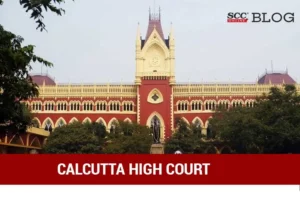Calcutta High Court: In a petition challenging the order of civil judge which allowed an application under Order VI Rule 17 of the Civil Procedure Code, 1908 (CPC) to amend the written statement and introduce a new fact that an unregistered will was executed, a single-judge bench comprising of Ajoy Kumar Mukherjee,* J., upheld the lower court’s decision to allow the amendment, emphasising the necessity for the effective adjudication of the suit as the validity of the alleged unregistered will directly impacted the reliefs sought in the suit.
Factual Matrix
In the instant matter, the petitioner challenged order dated 12-10-2018 passed by the Civil Judge (Senior Division) under Article 227 of the Constitution of India. The petitioner claimed to be the married daughter and executrix of her mother’s last will, duly registered on 13-03-2014, bequeathing the entire suit building to the petitioner and her brother. A suit was filed, among other reliefs, seeking eviction of the defendants (opposite parties) from the suit property, claiming them as trespassers.
Defendant 1 filed a written statement denying the allegations in the plaint. Subsequently, the defendant 1 filed an application under Order VI Rule 17 of the Civil Procedure Code, 1908 (CPC) for amending the written statement, introducing a new fact that an unregistered will was executed in their favor on 22-05-2006 by the same testatrix. The petitioner objected to the amendment, arguing that it was belated and aimed at changing the nature of the suit. The lower court allowed the amendment, leading to the petitioner’s challenge.
Moot Point
-
Whether the lower court erred in allowing the amendment to the written statement at a belated stage?
-
Whether the proposed amendment, introducing a new unregistered will, is necessary for the effective adjudication of the suit?
-
Whether the probate proceeding initiated by the deceased had abated, rendering the proposed amendment irrelevant?
Parties’ Contentions
The petitioner contended that the proposed amendment was an attempt to manipulate the case and was irrelevant since the probate proceeding initiated by the deceased defendant had abated. The petitioner argued that the lower court failed to appreciate the potential change in the nature of the suit.
The defendants argued that the amendment was crucial for the proper adjudication of the suit, as the validity of the will executed in favor of the petitioner was disputed. It was asserted that the proposed amendment did not alter the fundamental nature of the case and was essential for a conclusive decision.
Court’s Analysis
The Court considered the principles guiding amendments under Order VI Rule 17 of the CPC. The Court emphasised on the factors such as necessity for effective adjudication, bona fide nature of the application, absence of irreparable prejudice to the other party, avoidance of injustice, and non-constitutionally changing the nature of the case.
The Court rejected the petitioner’s contention that the probate proceeding abatement made the proposed amendment infructuous. The Court held that the amendment did not fundamentally change the nature of the case and allowed for a just decision on the controversy between the parties. The Court held that the proposed amendment, introducing a new unregistered will, was necessary for the effective adjudication of the suit, as it directly impacted the reliefs sought by the petitioner. The Court reasoned that the probate proceeding had not been finally disposed of, and the question of which will was the last will remained crucial.
Court’s Decision
The Court held that the impugned order allowing the amendment did not warrant interference under Article 227 of the Constitution of India. Additionally, the Court dismissed the petitioner’s request for a certificate under Article 134 A for appeal to the Supreme Court and refused to stay the operation of the judgment and order.
[Ellora Sadhukhan v. Tapan Kumar Saha Roy, 2024 SCC OnLine Cal 937, order dated 02-02-2024]
*Judgment by Justice Ajoy Kumar Mukherjee
Advocates who appeared in this case:
Mr. Gautam Chakraborty and Mr. Avijit Chakraborty, Counsel for the Petitioner
Mr. Rwitendra Banerjee, Counsel for the Opposite Party 1(a) and (b)
Mr. Gunjan Shah and Ms. Shreya Agarwal, Counsel for the Opposite Party 2 and 3


